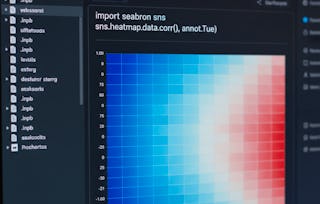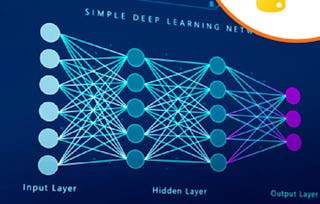By the end of this course, learners will be able to analyze datasets, apply machine learning algorithms, evaluate classifiers, and implement deep learning models using Python and its popular frameworks. The course begins with the foundations of AI, covering essential concepts such as Python for AI, bias-variance tradeoff, and model evolution. Learners will then explore data handling, visualization, dimensionality reduction, and classifier evaluation to strengthen practical ML skills. Finally, the course dives into advanced AI with multilayer perceptrons, clustering, ensemble methods, and hands-on practice with TensorFlow, Keras, and PyTorch.

AI with Python: Apply & Implement ML Models

AI with Python: Apply & Implement ML Models
This course is part of Artificial Intelligence with Python: Foundations to Projects Specialization

Instructor: EDUCBA
Access provided by KAUST Academy learning programs
11 reviews
What you'll learn
Analyze datasets and apply key ML algorithms in Python.
Evaluate classifiers and perform dimensionality reduction.
Build deep learning models with TensorFlow, Keras, and PyTorch.
Skills you'll gain
- PyTorch (Machine Learning Library)
- Data Preprocessing
- Keras (Neural Network Library)
- Tensorflow
- Model Evaluation
- Matplotlib
- Python Programming
- Jupyter
- Artificial Intelligence
- Applied Machine Learning
- Artificial Neural Networks
- Machine Learning
- Dimensionality Reduction
- Deep Learning
- Supervised Learning
- Data Manipulation
- Data Cleansing
- Skills section collapsed. Showing 9 of 17 skills.
Details to know

Add to your LinkedIn profile
11 assignments
September 2025
See how employees at top companies are mastering in-demand skills

Build your subject-matter expertise
- Learn new concepts from industry experts
- Gain a foundational understanding of a subject or tool
- Develop job-relevant skills with hands-on projects
- Earn a shareable career certificate

There are 3 modules in this course
This module builds a strong foundation in Artificial Intelligence by introducing Python’s role in AI, exploring the basics of machine learning, and emphasizing the importance of data processing. Learners will also examine the concepts of bias, variance, and model evolution while gaining hands-on exposure to Scikit-learn, a widely used machine learning library. By the end of this module, learners will be equipped with essential skills to begin building AI solutions confidently.
What's included
8 videos3 assignments
This module focuses on data handling, preprocessing, and visualization to ensure clean and structured datasets. Learners will practice applying dimensionality reduction techniques, model selection strategies, and classifier methods such as KNN. Additionally, the module highlights evaluation metrics, statistical analysis, and encoding methods to improve classification performance. By completing this module, learners will gain practical skills to prepare data effectively and build accurate machine learning models.
What's included
12 videos4 assignments
This module introduces learners to advanced AI techniques, including multilayer perceptrons, clustering, and ensemble methods. It also provides hands-on exposure to popular frameworks like TensorFlow, PyTorch, and Keras within Jupyter Notebook environments. The module concludes with practical applications in binary classification, documentation using Markdown, and visualization with Pyplot, empowering learners to implement deep learning models and present AI projects effectively.
What's included
9 videos4 assignments
Earn a career certificate
Add this credential to your LinkedIn profile, resume, or CV. Share it on social media and in your performance review.
Why people choose Coursera for their career

Felipe M.

Jennifer J.

Larry W.

Chaitanya A.
Learner reviews
- 5 stars
90.90%
- 4 stars
9.09%
- 3 stars
0%
- 2 stars
0%
- 1 star
0%
Showing 3 of 11
Reviewed on Feb 1, 2026
Excellent learning experience. The step-by-step approach makes it easy to grasp AI concepts without feeling overwhelmed.
Reviewed on Jan 14, 2026
This course provides a clear and practical understanding of AI and machine learning using Python. The concepts are explained in a simple way, making it easy to apply them in real-world projects.
Reviewed on Jan 19, 2026
A well-paced course that keeps learners motivated from start to finish.





